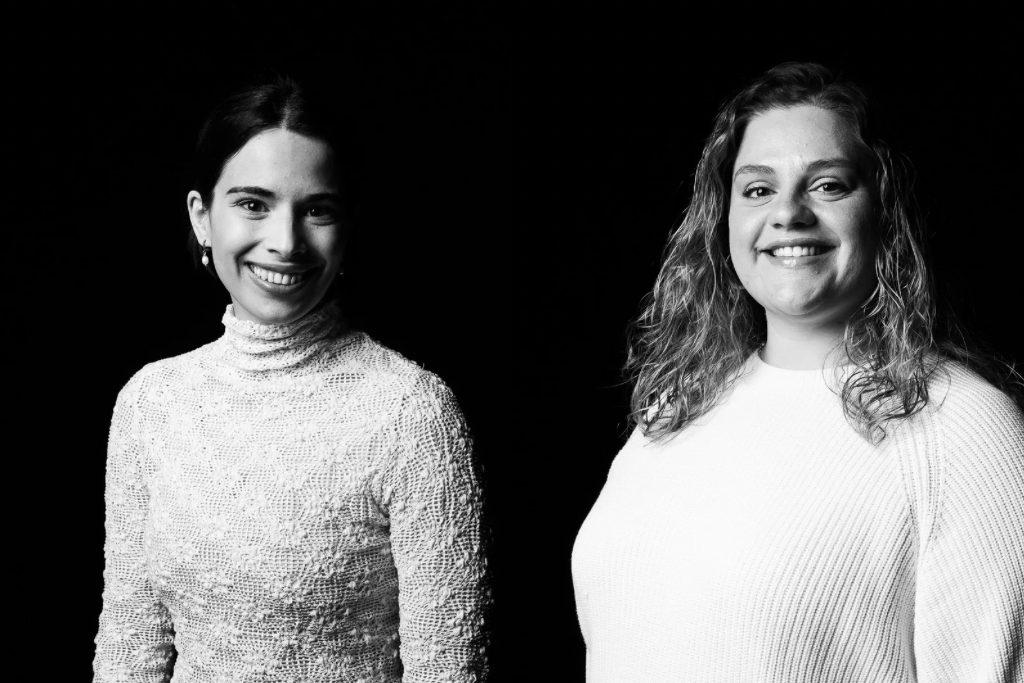Anna unveiled
With Silenzio, composer Karmit Fadael offers the audience a glimpse into the inner world of Anna – the main character from Le Villi. Soprano Sílvia Sequeira gives her a voice. How does a new work like this come into being, how do you convey it to the audience, and to what extent is that a collaboration between composer and singer? After a long day of rehearsals, the two women sit down on the terrace and talk.
Karmit, what inspired you most when composing Silenzio?
Karmit: ‘The story of Le Villi was my starting point. I was curious how I could give the character of Anna more depth. In Le Villi, things just happen to her, I wanted to show the audience what I imagine is going on inside her head. I started with the text, together with Rick van Veldhuizen. Then I began improvising on the piano, the violin, and with my voice. That’s how I gradually developed the sounds that represent Anna’s inner world. They’re often thoughts turned into melodies: magical, dreamy, anxious – very emotional, in any case.’
How would you describe your style in Silenzio?
Karmit: ‘My style is – unlike Puccini’s Romantic one – more baroque-contemporary. In this work, I was especially guided by the idea of a character who has lost herself, so her emotional state isn’t calm, but fragmented and intense.’
What is that like for you to sing, Sílvia?
Sílvia: ‘Karmit’s music, with all its different colours and emotions, I sing with a narrower voice. My sound has to come from a single line, whereas with Puccini, I just open my mouth and body and let the sound resonate everywhere. In Silenzio, I use a vocal technique that’s more typical of the Baroque period, and in Le Villi, my lush Romantic voice takes over. I sing Silenzio more with the head, to convey Anna’s thoughts. I have less freedom in that, and I need to be more precise. Whereas Puccini’s music is pure emotion, straight from the heart: if I feel it, I can stretch lines or notes more freely.’
Karmit, did you already have Sílvia in mind while writing Silenzio?
Karmit: ‘Absolutely. I listened to countless recordings of Sílvia and spoke with her.’
Sílvia: ‘It was wonderful that Karmit asked about my vocal range, what’s most comfortable for my voice, what my strengths are. It really feels like a collaboration.’
Karmit: ‘I think it’s really important to explore together what works best.’
Sílvia: ‘It was fantastic that Karmit immediately adjusted something when I said it wasn’t working so well for my voice. I’m really happy with this score. And it’s such a joy to be able to ask a living composer directly how they want something to sound. That makes it much easier to build and unravel Anna’s character.’
Karmit: ‘As a composer, all you do is put notes on paper. Then it almost feels like the piece is being recomposed through the performer’s interpretation. I really love working together with the singer or instrumentalist(s), and writing it in a way that feels good for them. It’s always beautiful to see what they do with the work.’
Does singing Silenzio influence how you interpret Le Villi?
Sílvia: ‘Definitely. Because we perform Silenzio first, I have to approach Le Villi a bit differently than I would if we were just doing Le Villi on its own. I want to make sure the two pieces connect well and feel like a cohesive whole.’
You’ve sung many of Puccini’s operas – what’s it like to perform his very first opera?
Sílvia: ‘Puccini is one of my favourite composers! And Le Villi is beautiful. You just notice in small ways that he was still a bit inexperienced, especially in writing for singers. He experiments and learns, just like anyone at the beginning. And because of that, I finally get to see him as a human being, not just a genius. That doesn’t take away from the beauty of this piece – I absolutely love singing Puccini. And Silenzio too!’
Interview: Kyra Bertram
